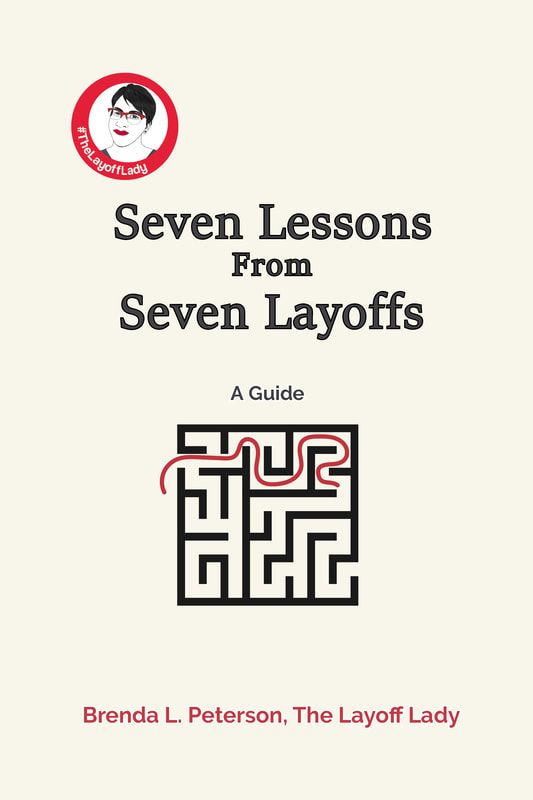|
By Brenda L. Peterson, The Layoff Lady You Can't Do It AllDuring your job search, there are always a ton of things you could be doing. Unfortunately, there is not enough time to do everything you could possibly do. Therefore, it’s crucial to manage your time. This helps make sure you are doing the highest value activities that will get you closer to your goal of landing a new job. Let's look at a few helpful strategies. Saying NoOne of the best time management strategies is the simple act of saying no. When you’re in between paid jobs, people may go out of their way to find ways to occupy “all that free time” you have. Being raised to be a nice, pleasant human being, I have a long history of saying yes to things I shouldn’t have. While saying no can be difficult, in your role as the CEO of You, it’s your job to prioritize your time wisely to help you achieve your goals. You might want to say no to doing extra volunteer work for your child’s school, church, or favorite charitable cause. You might want to skip helping someone landscape their yard, paint their house, or move. You might want to refrain from attending an additional school play, driving an extra carpool shift, or chaperoning one more event. In short, you get to spend your time in whatever activities bring you joy and/or get you closer to finding a new job. Ensure you align your time with your goals and do not take on additional tasks out of a sense of guilt, obligation, or good old-fashion task avoidance. Creating Your ScheduleOne benefit of working for someone else (aside from, you know, the whole getting paid thing) is that it gives your life structure. When you’re in career transition, making yourself some kind of schedule is valuable. It doesn’t have to be rigid or rigorous. Having more structure is helpful when you’re struggling. Systems help because they give you some idea of what to do with yourself if and when your plans change. Even if you don’t follow your schedule to the letter, having structure around your time can help address your need for order and give you a sense of accomplishment. Blocking Off TimeIf I have a blank calendar, I have difficulty accomplishing anything because I have too little structure. Conversely, if I overschedule myself, I will be frustrated because I have too much structure. Blocking off time for dedicated activities is how I balance the two extremes. During these time blocks, which are usually 1-2 hours long (for me), I focus on the task at hand. For example, during this time, I might search for new open positions, customize my resume for a certain role, or write a few thank you messages. Making an appointment with myself helps me get things done. I also block out time for fun activities. Whether when the roller skating rink is open, when my coffee group is meeting, or an hour to walk on a nice day, blocking off time helps me prioritize activities that bring me joy. Batching WorkThere are some things that I need to do multiple times in a day or a week or similar tasks that go well together. Work batching is a way to help increase your efficiency with these types of tasks. Here are a few examples of the kind of work I batch:
Grouping tasks tends to improve efficiency and boost productivity. Setting a TimerMost people’s productivity decreases the longer they work on the same task. One way to use your time more consciously is by using a timer. For example, I set a timer for 50 minutes, then take a 10-minute break. This way, I have a set time to focus, but I also know it won’t last forever. In addition, if I’m spinning on a task and not accomplishing anything, taking that 10-minute break usually gets me out of that thought trap. During the 10-minute break, I switch gears. I stand up, stretch, or take a few deep breaths. Sometimes, I’ll even do a quick beta task, like folding towels, before returning to my alpha work. When my timer goes off and my break ends, I begin again. Breaks can work wonders to stop you from spiraling by helping you re-engage with a given task. Learn More
0 Comments
By Brenda L. Peterson, The Layoff Lady You Have A Job Offer!Finally having a job offer after your post-layoff job search is a call for celebration. Now, you can breathe a sigh of relief and start to build your new post-career transition normal. While you may want to shout from the rooftops that you've finally landed and start celebrating, I suggest you play it cool for a couple more weeks. In most cases, accepting a job offer will lead to you starting that job just as planned. On rare occasion, something happens and that job offer falls through. Just in case, I suggest taking a few interim steps between the time you accept your job offer and the day you start your new role. How Often Are Job Offers Rescinded?In my long history of layoffs and finding my next job, I have had a job offer fall through exactly once. That means that through seven layoffs, I have had to revise my plan one whole time. Job offers can be rescinded for a number of reasons. For example, I have heard more about job offers being rescinded early in the pandemic as companies were realigning staff and when companies have been going through financial hardships. It might also be a case wehre funding for a role seemed certain, and then did not come through. In yet other cases, between the time the offer was accepted and the new employee's start date, someoen in teh organization could have just decided they want to hire someone else, not fill that role at all, or put the role on hold. In short, you can't necessarily predict when a job offer will evaporate. LIke with any job, you can look for red flags. My Rescinded Job Offer ExperienceAt the end of February, I accepted an L&D Manager role where I would build the training function from the ground up in a fast-paced startup environment. I was very excited about the opportunity, and happy that my job search--which was then clocking in at about 5 months--would be over soon. After a disjointed, a little all over the place hiring process, and an offer that took a couple of weeks to come to fruition as promised, I happily accepted and had a start date of mid-March. Soon, I did my "hooray I got a job--more details later" on LinkedIn. I didn't mention the company's name at this time since I had not yet started. I learned that lesson after announcing a job that I had accepted and not yet started--and later learned that the company had not yet notified internal candidates that they hired someone external. I was excited to have a two week gap between when I accepted the job offer and my start date. A week before my start date, I got a call from the recruiter for the role telling me that there would be a delay in my start date--and he wasn't sure how long. A few days later, I talked with the hiring manager and learned more. They were going to hold off on my start date until numbers had come in from the first quarter. She assured me there were no real concerns that I would start, but it was more when. I asked if this role was really going to happen, and I got sufficient assurances that the job would, indeed, start within a month or two at the latest. She would keep me posted on updates. The longer I waited, and the fewer updates I heard, the less confident I was the job would happen. Of course, I'd already announced that I had a new role and taken y LinkedIn profile out of job search mode, so I lost a couple of months of job search time waiting for a start date to materialize. The assurances became less frequent, and less convincing, until I got a call from the recruiter with apologies because the role was not actually happening. ...and now I had lost 2 months of job searching time and had to restrategize and restart my search. A New PlanEven though having a job offer rescinded is not a regular occurance, it is still a risk worth thinking through. Just like we buy car insurance just in case we're involved in an accident, I realized I needed to mitigate my risk of being left without a job should a job offer ever fall through again again. Reccommended Next Steps After Accepting an OfferRemember, in most cases, accepting a job will lead to you starting to work for that company shortly thereafter. Even so, remember to act in your own best interest just in case the role does not pan out. Here are suggestions for you to consider:
Learn MoreBy Brenda L. Peterson, The Layoff Lady Demonstrating Your SkillsEmployers are trying to find someone to solve the unique problems their business has. Recruiters and hiring managers will want to make sure that candidates have the skills and competencies included on their resume. Let's look at a few ways employers might verify candidate abilities during the hiring process. About Assessments and Work SamplesDepending on the company, the newness of the position, and the level of the role, there may be more to the interview process than talking with all the stakeholders. Potential employers may also ask you to complete projects to demonstrate key skills. Some employers may rely on your existing portfolio and review your previous work. In other cases, employers may ask you to complete specific work samples as a part of the interview process. This means completing unpaid work during the hiring process to demonstrate your skills as they more directly align with that role. In addition, they might ask you to complete assessments as well. My Experience With AssessmentsAs a part of a few hiring processes, I’ve been asked to take various tests to assess my tendencies, abilities, and aptitudes. Key focus areas often include problem-solving, strengths, work style, spatial ability, logical thinking, and temperament. For one role after layoff #7, the first two “interviews” with one organization were online assessments that compared my test results to a role-specific and company-specific ideal profile. For that job opening, I had 2 “interviews” like this and received a rejection email without interacting with actual people. For another hiring process, I took online exams on logical reasoning, general intelligence, and basic math before I was eligible for a phone screen. In some cases, assessments may be a prerequisite to meeting with a human interviewer or may be included later in the process to gather supplemental information right before making an offer. Concerns With AssessmentsWhile assessments have value, they may not help employers find a better candidate. Assessments can be useful when they are used to verify skills relevant to performing a specific position well. However, some assessments may be checking for skills not required for a given role. In addition, some assessments are not intended to be used during the hiring process and may introduce irrelevant or biased information into the hiring decision. My Low Time Committment ProjectsAs someone who works in the field of learning and development, I expect a potential employer to ask to see my portfolio. In many cases, during the application process, they will ask for a link to an online collection of work samples. On occaision, potential employers will ask for reccommendations on which of my work samples they should review more closely that align with the specific skills for any given role. I'm also ready to talk an employer through my work samples and highlighting my process in developing those materials. I also expect to be asked to demonstrate my ability to present content to a group. On many occaisions, I've been asked to deliver an interactive 10-15 minute presentation on the topic of my choosing to a panel of interviewers. For a manager role, I've often been asked to put together a 30-60-90 day plan outlining my initial onboarding and how I would identify and prioritize projects. My High Time Committment ProjectsAs I’ve progressed into higher-level roles, the projects have become more time intensive and elaborate. Here are a few examples: For a consultant role, I was tasked with creating an innovative plan for employee onboarding for new contractors and full-time employees. For this project, I designed a pitch deck to garner buy-in from stakeholders on the solution. I delivered that presentation to a group including the hiring manager, additional managers, and team members. I also designed a blended learning solution that leveraged subject matter presenters and accommodated people having distributed locations and start dates. For a manager role, in addition to a 30-60 day onboarding plan for myself, and created a list of equipment, software, subscriptions, and additional resources needed to begin creating videos for the company. For a program manager role, I was tasked with creating an innovative onboarding program to teach new full-time staff about company products. I designed a new hire career fair with multiple tables showcasing different products, complete with a passport for trainees to collect stamps. Those trainees who visited each table and filled out their passports were enrolled in a prize drawing for a bigger company-branded prize. For a director role, during the initial application, I answered several essay questions along with my resume and a cover letter. Later in the interview process, after taking two professional assessments, I was also tasked with completing these three projects:
Concerns With ProjectsUltimately, I did not receive job offers for any of these roles where I completed more elaborate work samples. I also found it frustrating to be tasked with what ended up being hours and hours of skilled work without being compensated, or ending up with a job offer. In the abstract, I’ve seen many people bluster on social media about what they won’t do as part of an interview process. I also don’t necessarily disagree with the boundaries those people suggest. I do know that making that decision feels much different in the throes of job searching. When being asked to do a few projects to help you get a job you think you’ll love, it’s often hard to say no. Here are a few suggestions I have for deciding what you personally are willing to do as a part of the interview process. Strategies to Adapt
Learn More |

Just get laid off?
Click here for info on what to do first. Author7-time layoff survivor Brenda L. Peterson, The Layoff Lady, waxes poetic on layoffs, job transitions, & career resilience. Buy The Book!Were you recently laid off from your job and need a roadmap for what's next? Pick up a copy of my book, Seven Lessons From Seven Layoffs: A Guide!
Categories
All
Archives
July 2024
|








